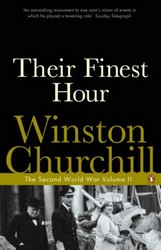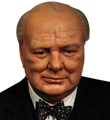Their Finest Hour
|
| updated |
Copy Link Code
|
 The Winston Churchill "finest hour" speech was actually the third speech given to Parliament's House of Commons on June 18, 1940. Given a little over a month following his assumption of duties as Prime Minister – after being appointed by King George VI – Churchill was still attempting to rally for support among his colleagues, who had ostracized him for years previous.
The Winston Churchill "finest hour" speech was actually the third speech given to Parliament's House of Commons on June 18, 1940. Given a little over a month following his assumption of duties as Prime Minister – after being appointed by King George VI – Churchill was still attempting to rally for support among his colleagues, who had ostracized him for years previous.
During a five-week period, surrounding the Battle of France – and just before the Battle of Britain – Churchill delivered three speeches in rather quick succession, to gain support for the upcoming war. With the speeches given on May 13, June 4, and June 18 they also served as a sort of update to his fellow members, regarding recent military actions and plans for future actions. The first speech, given May 13, is commonly referred to as the "Blood, toil, tears, and sweat" speech, wherein he explained the all-party coalition government recently formed, and informed Parliament that he would offer all he had (blood, toil, tears, and sweat) until ultimate victory was achieved. The second speech is known as the "We shall fight on the beaches" speech, given June 4. In this lengthy oratory, he reported the Germans' success in Holland, Belgium, and France, and tried to prepare his people for a fight.
When the third speech was given, it was only two days after France had already sought armistice (June 16) and failed. Churchill used the speech to explain why it was justified to have so little support for France. He also told about the evacuation of the forces supporting France – which had been successful. He gave a detailed review of the forces that would still be available, should there be any attempts at invasion, for prevention or to repel it. Further, he told of the Dominions' messages of support, justifying the seemingly impossible victory, despite the fact no one could specify how it would be achieved.
Finally, after his lengthy reports and summaries on military action, Churchill got to the peroration – the closing part of a speech, which summarizes and appeals to the audience, appealing to their pathos (sympathy). Having practiced his oration for decades at this point, Churchill was extremely effective at delivering the peroration of his speeches. In this particular case, he warned that the Battle of France had concluded, and the Battle of Britain was about to begin, "The whole fury and might of the enemy must very soon be turned on us. Hitler knows that he will have to break us in this island or lose the war." He further warned that if they failed to defeat Hitler at this pivotal moment, the world "will sink into the abyss of a new dark age made more sinister, and perhaps more protracted, by the lights of perverted science." Finally, he closed with the oft-repeated words, regarding the memory he wanted to leave behind, "Let us therefore brace ourselves to our duties, and so bear ourselves, that if the British Empire and its Commonwealth last for a thousand years, men will still say, this was their finest hour."
